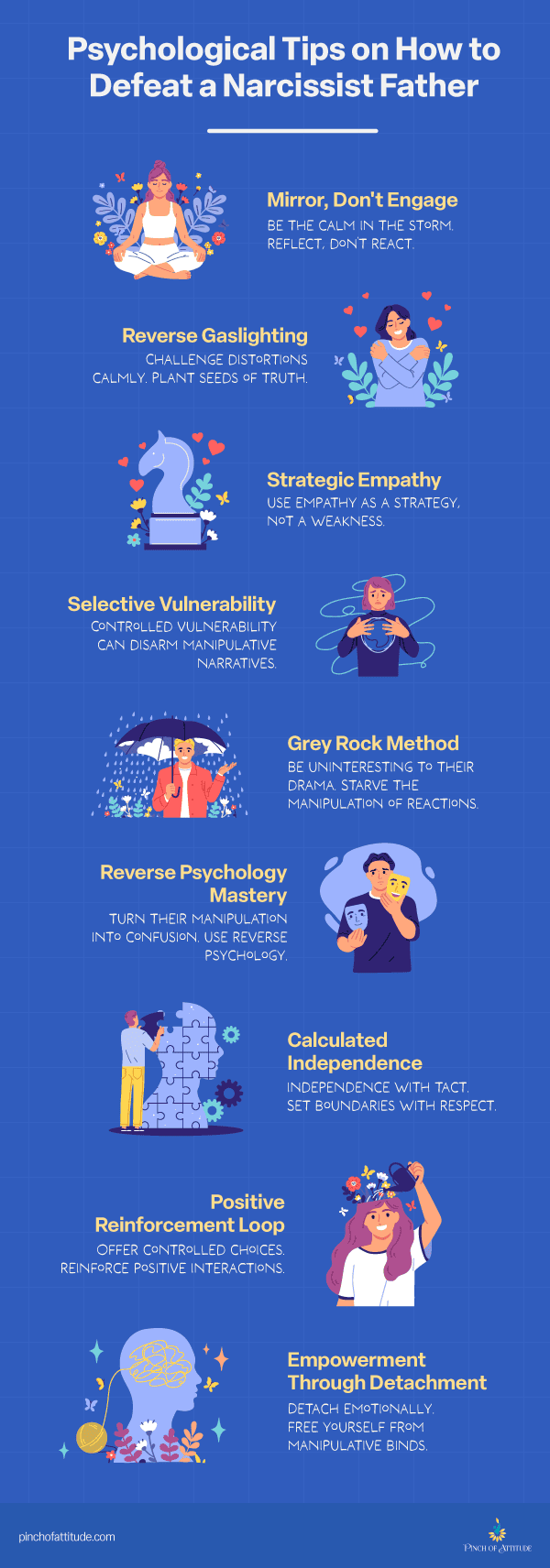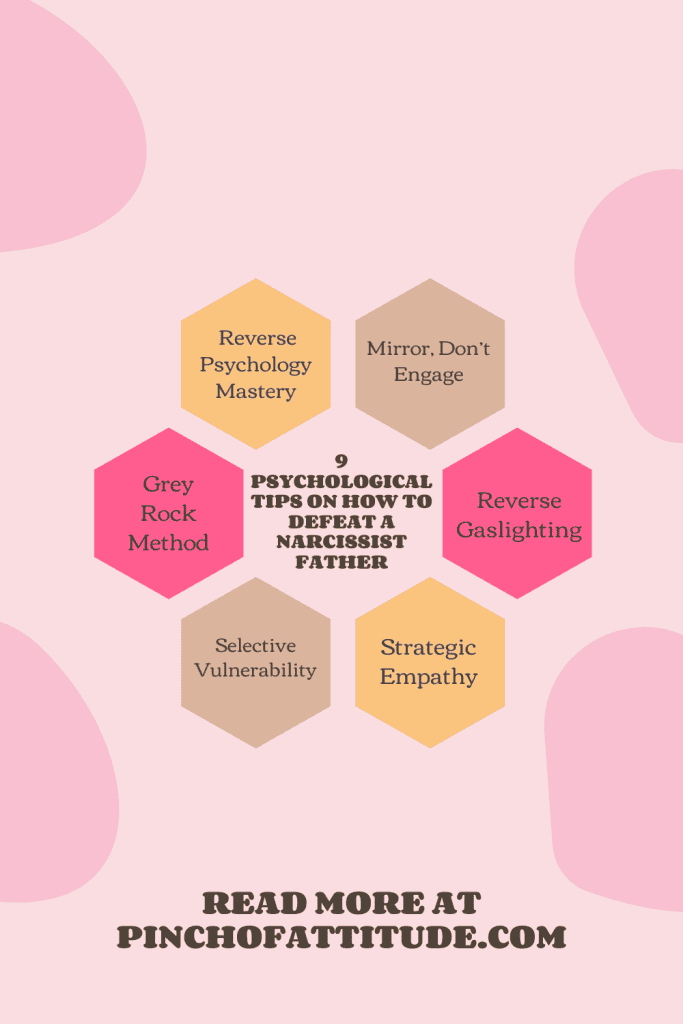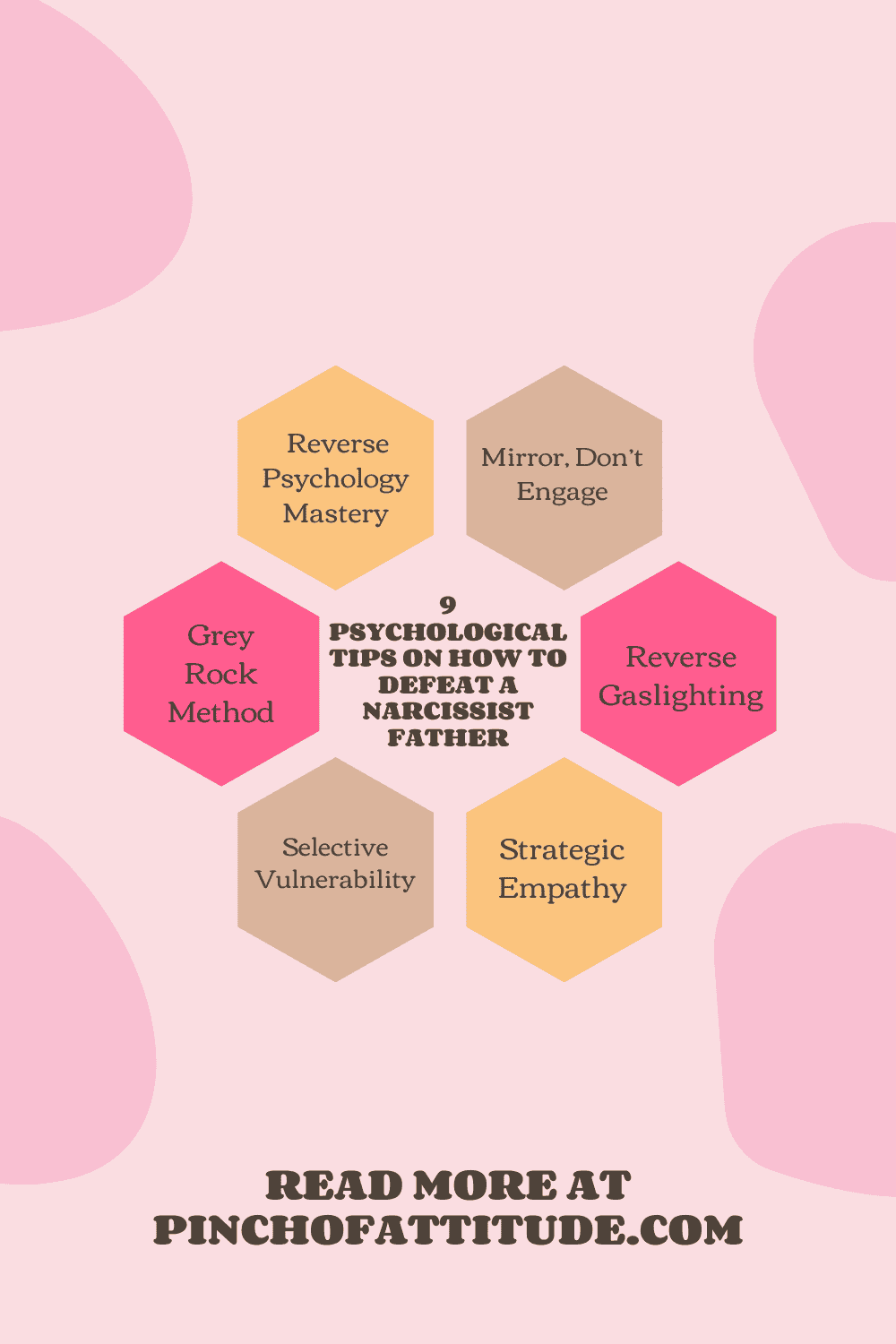Did your childhood feel like a zero-sum game, where your narcissist dad’s ego feasted on your emotional crumbs? If so, you’re in the right place.
Trust me, I understand why you’re eager to learn how to defeat a narcissistic father.
I spent years dodging emotional landmines disguised as conversations with my own narcissistic mom.
Therapy can help, but you can also take back your power with the right strategies and a warrior’s spirit.
Below, I’ll share with you how I did it so that you can finally reclaim your peace and break free from the grip of the narcissist in your life.
- Don’t fight fire with fire. Use strategic tactics to regain control and protect your well-being.
- You can’t change their behavior, but you can change how you react. Detach from their drama, manage your emotions, and rewrite the narrative of your own life.
- Seek professional help if needed, and focus on your own recovery. Your journey to self-love and healthy relationships is the ultimate win.
Table of Contents
9 Psychological Tips on How to Defeat a Narcissist Father

We’ve all heard the whispers and read the articles – the challenges of dealing with a narcissist dad, the emotional toll it takes on adult children of narcissistic parents, and the near-impossible feat of trying to change a narcissist.
But before you get lost in the frustration, remember this: your well-being matters most. Your best chance is to shift your focus from changing them to empowering yourself.
These following tips aren’t about winning a battle of wills. It’s about equipping you with the psychological tools to deal with these complex dynamics.
1. Mirror, Don’t Engage
Is your dad throwing another tantrum about “your disrespect”? Here’s a ninja move straight from the “Dealing with Narcissistic Parents” handbook.
Picture this: Dad yells, and you yell back. Boom, you’re sucked into the emotional tornado. So, instead of doing that, try calmly reflecting on his behavior.
Say something like, “Wow, it seems like something really upset you. Can you tell me what’s going on?” and watch the gears grind!
By not engaging, you force him to confront his own mess. Remember, narcissistic fathers often thrive on reactions – deny them that fuel.
No, you’re not condoning his narcissistic behavior. You’re reclaiming your sanity.
Emotional abuse thrives on engagement, and lack of empathy means apologies are rare. So, learn how to manage the situation without getting sucked in.
Tip
Be the calm in the storm, the steady voice in the chaos. You’ll be surprised how quickly the power dynamics shift when you stop playing his game.
2. Reverse Gaslighting
Gaslighting is a form of emotional manipulation common in people with NPD.
For example, a parent with narcissistic personality disorder may say you’re remembering things wrong or twist your words to make you seem unreliable.
But what if you could turn the tables? Enter reverse gaslighting.
Don’t get me wrong. This isn’t about revenge, it’s about subtly challenging their distorted reality without confrontation.
Imagine Dad boasting about a “hilarious” prank he pulled on you that left you in tears.
Instead of getting defensive, try a calm, “Huh, I remember it differently. I felt really hurt that day.” Don’t expect apologies, but the seed of doubt is planted.
Their inflated sense of self is fragile, and any crack can be unsettling. By calmly stating your truth, you show you won’t be a puppet in their play.
3. Strategic Empathy

Children raised by narcissists are like emotional detectives, trained to sniff out their parent’s triggers like a bloodhound on a scent.
We’ve spent years dealing with changing moods and manipulation, learning to predict the outcome before they even hit.
But here’s a secret weapon we often forget: strategic empathy.
It may seem counterintuitive to offer understanding to someone who’s caused you pain, but think of it like disarming a bomb.
When you understand what it’s like to walk in his shoes, you can anticipate his moves and respond accordingly.
Let’s say your dad launched into a tirade about your “failure” to land your dream job.
Rather than fueling the fire with defensiveness, try a calm, “I know how much this career means to you. It must be frustrating that things haven’t gone as planned.”
This calculated empathy robs narcissist parents of the power they crave: control of your lives.
4. Selective Vulnerability
Children of narcissists know the drill. Their only goal is to please their parents with a forced smile and a perfect facade.
Just tell them what they want to hear, and everything will be fine, right? Right?
But what if there was a way to disrupt this power dynamic, to use vulnerability as a weapon, not a shield?
You’re not oversharing or seeking their approval. You are strategically revealing a carefully chosen vulnerability that throws them off balance.
For example, when your dad starts his speech about your “disappointing” life choices, instead of cowering, share a brief, genuine moment of vulnerability.
“Dad, I know I haven’t achieved what you hoped, and that hurts. But I’m trying, in my own way, to heal from the childhood trauma that still affects me.”
This forces them to confront the impact of their behavior, and their trauma bond with a narcissist they may not even be aware of.
5. Grey Rock Method
Picture yourself as a grey rock, so utterly uninteresting that your dad’s manipulative tactics bounce right off. Sounds boring, right?
But trust me, in the world of children of narcissistic fathers, boring is a superpower.
Your dad may try to bait you with a snide remark or a guilt trip but don’t react. Give him one-word answers, neutral facial expressions, and zero emotional engagement.
Why does this work? Simply because narcissistic manipulation thrives on a reaction.
Your anger, your tears, your frustration – that’s the fuel they crave. And by becoming the grey rock, you cut off their supply.
You’re basically saying, “Go play your games somewhere else.”
Tip
Master the game, not the narcissist. Rob them of the reactions they crave, and you’ll take back control of your story.
6. Reverse Psychology Mastery
Does Dad make you feel like you’re the puppet in this twisted play?
In my own experiences with my narc mom, I learned that recovering from the effects of being raised by a narcissist means learning to rewrite the script.
That’s how I came across reverse psychology.
Think of it like planting a mental seed. Imagine Dad’s usual guilt trip about your “irresponsible” living situation.
Instead of getting defensive, say, “Wow, you’re right. Maybe I should consider moving closer to you, like you suggested. We could spend more time together!”
Plant the seed, let it simmer, and watch them twist themselves into knots trying to “steer” you towards their original wish, the narcissist’s way.
It’s like watching a puppeteer get tangled in his own strings.
7. Calculated Independence
Often, a narcissistic dad’s “helpful” suggestions feel more like invisible leashes.
My mom is the same way. That’s how I learned about one of the effects of narcissistic parenting: needing independence while fearing the wrath of their need for control.
But there is a way to break free without setting off emotional fireworks.
For example, has your dad ever offered to “help” with your finances, his not-so-subtle way of keeping tabs?
Rather than a defiant refusal, express gratitude while calmly outlining your plan for financial independence.
“Thanks, Dad, I appreciate your concern. But I’m actually working on a budget and learning to manage my finances myself.”
It’s a firm boundary, delivered concerning his needs and emotions.
8. Positive Reinforcement Loop
Narcissists crave control of their children, and sometimes, the best way to deal with a narcissistic parent is to give them the illusion of it.
But in a way that benefits you, of course.
How is this done, you ask? Let me give you an example.
Your dad may show up uninvited to your home, which I know from experience with my mother is highly likely.
Instead of a screaming match, try acknowledging his presence calmly by saying, “Oh, hi Dad, didn’t expect you.”
Then, set a clear, positive boundary in exchange for a desired behavior. You can say, “If you call first next time, we can grab coffee on Friday.”
It may feel counterintuitive, but remember, narcissists often cross your boundaries simply to prove they can.
By offering a positive path to “control” (like calling first), you give him something to work towards, while subtly reinforcing your boundaries.
9. Empowerment Through Detachment
I’ve listed all kinds of psychological tips, but the ultimate weapon in your arsenal isn’t a strategy. It’s a state of being.
It’s important to recognize that detachment doesn’t necessarily mean cutting him off like a dead branch. Rather, it’s about cutting off the emotional vines that bind you.
Think of it like untangling a knot. Every comment, every manipulative jab, used to tug at your emotions, keeping you trapped in their dance.
Now, imagine stepping back, observing their words with a sense of calm detachment. Even if they tell the same old stories, weaving the same webs of guilt, you choose not to get caught.
Remember, this might not happen overnight.
Detachment is a muscle you build, with every breath, and every conscious choice to disengage. But with each knot you untangle, you become freer, lighter, stronger.
What Are the Weaknesses of a Narcissistic Father?

The biggest weakness of a narcissistic father is his inability to truly connect with his children.
Sure, they may project an image of power and control.
But their underlying struggles with low self-esteem and a deep need for admiration and excessive attention leave them incapable of forming genuine bonds.
This also means their happiness hinges on external approval, making them incredibly sensitive to criticism.
You will also notice that their narcissism causes them to be self-centered and develop an inflated sense of their own importance.
But beneath the grandiose exterior lies a gnawing fear of being exposed as a fraud.
Because of this, narcissistic parents use their children to get what they want using guilt trips, emotional blackmail, or even outright hostility.
A life lived hurting others is a missed opportunity to experience the joy of genuine connection and love.
And that, for me, is what will lead to a narcissist’s downfall.
Tip
Having a narcissistic dad can take a toll on your mental health and wellness, but professional help is available. A qualified mental health professional can help you process your experiences and develop coping mechanisms.
How Do Narcissistic Fathers Respond When You Overpower Them?
A narcissist may respond in various ways when you overpower them.
But all those reactions stem from a deep-seated fear of losing control and seeing his inflated self-image crumble.
His response usually falls into one of these categories:
- Rage and aggression: He may lash out with verbal or even physical abuse, trying to take control of the situation through intimidation.
- Gaslighting and manipulation: He might attempt to rewrite the narrative, deny your perspective, or twist your words to make you doubt yourself.
- Sulking and withdrawal: Some narcissistic fathers retreat into silence or self-pity, hoping to manipulate your empathy and regain control through guilt.
- Grandiosity and deflection: He might try to deflect attention by boasting about his accomplishments or shifting the blame to others.
- Pseudo-acceptance and compliance: In rare cases, he may feign agreement or even pretend to change his abusive behavior.
Remember, overpowering a narcissist isn’t about winning a battle or seeking revenge.
You didn’t choose to have a parent with narcissistic tendencies, but you can choose to not be his victim anymore.
Tip
To deal with a narcissistic person in your life, set firm boundaries, protect your well-being, and reclaim your emotional autonomy.
Related Posts:
- 30 Things Narcissistic Fathers Say: How to Verbally Disarm Them
- How to Deal With a Covert Narcissistic Father: 11 Eye-Opening Tips
- How to Protect Yourself From Narcissistic Family Members? My Personal Advice
- 7 Weaknesses That Expose a Narcissist’s True Nature
- 5 Tips On How to Manipulate The Narcissistic Manipulator
Frequently Asked Questions
How do you destroy a narcissistic father?
The best way to destroy a narcissistic father’s influence on your life is to promote self-growth, detach emotionally, and prioritize your personal well-being.
Can you outsmart a narcissistic father?
Yes, you can outsmart a narcissistic father by staying calm, maintaining your boundaries, and avoiding emotional triggers. Seek support when needed.
What exact words can destroy a narcissistic father?
Focus on assertiveness, not aggression. Try saying, “I won’t accept disrespect. Change or lose me” and watch his shocked reaction.
How to psychologically mess with a narcissistic father?
Mess with your dad’s mind by being unpredictable, showing indifference, and challenging his ways subtly.
How do you take power away from a narcissistic father?
Reclaim power from your father by showing him you can build healthy relationships with others even after all you’ve experienced.




